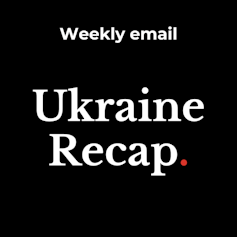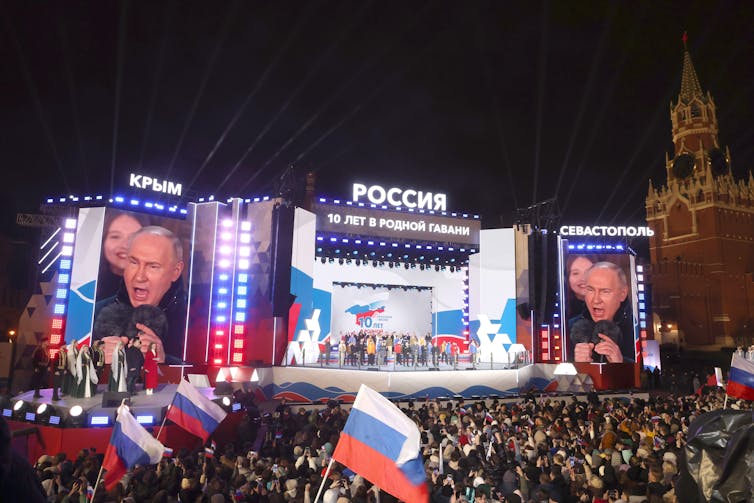Vladimir Putin says he has no intention of attacking any Nato members. Visiting an airbase in Torzhok, on the road between Moscow and St Petersburg, the Russian president told a group of pilots he didn’t plan to spark a war with any members of the western alliance which might bring in the US, with its massively greater defence budget.
“The idea that we will attack some other country – Poland, the Baltic States, and the Czechs are also being scared – is complete nonsense. It’s just drivel,” he said.
But he did leave himself a little wriggle room. Declaring that if Ukraine used F-16 fighter aircraft supplied by its western allies, “We will shoot them down,” – adding: “Of course, if they are used from airfields in third countries, they become legitimate targets for us, wherever they are.”
And, let’s not forget, he was rubbishing the idea that he intended to invade Ukraine until days before he dispatched Russia’s war machine across the border for its “special military exercise”.
In any case, they aren’t taking much notice of Putin’s reassurance in the Baltic states, where they have long and bitter memories of being occupied by the Soviet Union in 1940 followed by more than five decades of enforced membership of the Soviet bloc. Latvia, Lithuania and Estonia agreed in January to set up a common Baltic defence zone on their borders with Russia and Belarus and the three countries have each embarked on massive defence programmes, including expansion of their militaries and huge defence construction projects.
Natasha Lindstaedt, a specialist on authoritarianism at the University of Essex, believes the possibility that Donald Trump might return to the White House in 2025 has focused minds in the Baltics. Trump has signalled he intends to end the war in Ukraine “within 24 hours”, probably by cutting off US support to Ukraine (a job his proxies in the US congress are doing pretty effectively already as they drag their feet over passing Joe Biden’s aid bill).
Peter Hermes Furian/Shutterstock
He has also been outspoken in his criticism of Nato, although he recently said he wouldn’t take the US out of the alliance, as long as its European member states pay their way. But his qualification of this support: “We have an ocean in between some problems … we have a nice big, beautiful ocean,” would have set nerves jangling. So the Baltics, which would be the Nato members most exposed to a possible Russian escalation, are making their own preparations.
À lire aussi :
Ukraine war: Russia’s Baltic neighbours to create massive border defences as Trump continues undermining Nato
Speaking of elections, perhaps the least surprising news of the year was that Vladimir Putin won another six year term of office (which we were able to confidently predict in the last Ukraine recap two weeks ago even as polling stations opened). Someone else with equal foresight (and a similar sense of humour) was the president of the European Council, Charles Michel, who tweeted his congratulations on the morning of the first day of voting.
Putin’s victory got a mixed reaction from world leaders. China and North Korea were quick to congratulate Putin, followed by Belarus, Venezuela and Cuba. Others to hail his “victory” included India, the Houthi rebels in Yemen and Hamas in Gaza. Meanwhile a roll-call of western leaders and senior diplomats declared their disgust at what Germany’s foreign minister, Annalena Baerbock, said “was not a real election”.
Stephen Hall, who researches authoritarian regimes at the University of Bath, says the west should take the advice of the Parliamentary Assembly of the Council of Europe, whose leader Theodoros Rousopoulos said Putin “clearly lacks any vestige of democratic legitimacy” and urged the international community to “no longer recognise Putin’s legitimacy as president”, adding: “We call on them to cease all contact with Putin, except in the pursuit of peace and for humanitarian purposes.”
Hall believes that declaring Putin’s presidency as illegitimate would send a message to Russian elites “that Putin has taken Russia down a dark and dangerous path” and reassure his opponents in exile that they have friends in high places. It would also make it easier to extend western sanctions against members of Putin’s regime.
À lire aussi :
Vladimir Putin: why it’s time for democracies to denounce Russia’s leader as illegitimate

Since Vladimir Putin sent his war machine into Ukraine on February 24 2022, The Conversation has called upon some of the leading experts in international security, geopolitics and military tactics to help our readers understand the big issues. You can also subscribe to our fortnightly recap of expert analysis of the conflict in Ukraine.
On the subject of sanctions, Robert Huish – an expert in international development studies at Dalhousie University in Canada – has been puzzling out how Russia managed economic growth of 3.6% in 2023 and is forecast to grow by 2.4% this year, despite being subject to more than 16,000 sanctions. The answer? Gold.
Russia is the world’s second largest producer of gold and a lot of countries are buying gold at the moment to hedge against uncertain economic times. Huish says it is trading billions and billions of dollars worth of gold, much of it via the United Arab Emirates, which Russia is using as a cut-out to sell gold to countries such as Switzerland, which imported US$8.2 billion (£6.5 billion) in gold from the UEA, most of it Russian.
One solution is for other gold-producing countries to up their output to bring prices down. And a targeted sanction on UAE gold exports could also help.
À lire aussi :
Vladimir Putin’s gold strategy explains why sanctions against Russia have failed
Moscow massacre
It should go without saying that it’s possible to decry the war in Ukraine while not wishing ill to befall individual Russians. And it’s in that spirit that we extend our sympathies to the families of the victims of the terrible massacre at Moscow’s Crocus City concert hall last week. And it was no doubt in the same spirit that the CIA sent information to Russian intelligence that an attack was imminent and would likely target a concert hall or other public performance space.
In the event, the warning was not heeded and more than 130 people lost their life in the attack. Robert Dover, an intelligence expert at the University of Hull, says there are a number of reasons why intelligence agencies – even those belonging to powers hostile to each other such as the US and Russia – might pool their knowledge: one of those over a number of years has been Islamic terrorism. Dover says cooperation on intelligence matters can also provide a back-channel through which other matters can be discussed without the usual performative diplomacy, which is very difficult given the war in Ukraine.
À lire aussi :
Moscow attacks: why the Kremlin may have ignored any terrorist warnings from the CIA
Putin, meanwhile and somewhat predictably, has still found a way of blaming Ukraine and the west, who – say he and his senior colleagues – were behind the attack despite it being claimed by Isis-K. As you’d expect, Russian social media has been running hot as people took to sites such as Telegram to share videos and speculate as to the identity of the culprits.
Olga Logunova, a researcher at King’s College London’s Russia Institute, has made an in-depth study of social media use in Russia. She says that Putin absolutely dominates discussion on social media sites, his mentions far outpacing any other personalities, whether they are politicians or pop stars. Only Alexey Navalny got anywhere close to matching Putin’s mentions – and only then at the time of his arrest in 2021 and his subsequent death last month.
À lire aussi :
What do Russians talk about on social media? Vladimir Putin dominates, while political friends and foes trail in the far distance
Crimea ten years on
Last week Putin celebrated ten years since Russia annexed Crimea by force. As for the people of Crimea, Shane O’Rourke, an expert in Russian history at the University of York, says their joy was far more muted. Ten years of occupation, the last two spent at war with their former compatriots, have given them little cause for celebration.

EPA-EFE/Sergei Ilnitsky
The peninsula’s economic mainstay, tourism, is in the doldrums, while a Russification campaign is destroying Crimea’s cultural identity and the Ukrainian and Tatar languages are being suppressed. Meanwhile residents are being forced to become Russian citizens whether they like it or not. Many do not: 50,000 people have left in the past decade.
À lire aussi :
Ten years since its annexation, Crimea serves as a grim warning to any Ukrainian lands that fall under Russian occupation
Further, as Stefan Wolff – an expert in international relations at the University of Birmingham – notes here, Russia’s grip on Crimea looks shakier now than at any time since 2014. There have been repeated attacks on the Kerch Bridge which connects Crimea to the mainland, while the peninsula is subject to regular drone attacks and the security situation has deteriorated to the extent that Russia’s Black Sea fleet has been forced to seek safer harbour on the Russian mainland.
Meanwhile Ukrainian intelligence chief Kyrylo Budanov signalled that a major operation aimed at further loosening Russia’s grip on Crimea was imminent. Things have now reached the stage where members of the Russian parliament recently introduced a draft bill on March 11 to annul the transfer of Crimea from Russia to Ukraine by former Soviet leader Nikita Krushchev in 1954. It’s an old Soviet trick, if you don’t like history, change it.
À lire aussi :
Ukraine war: ten years after Putin annexed Crimea, Russia’s grip on the peninsula looks shaky
Ukraine Recap is available as a fortnightly email newsletter. Click here to get our recaps directly in your inbox.
Loading PerspectiveSplit analysis...



